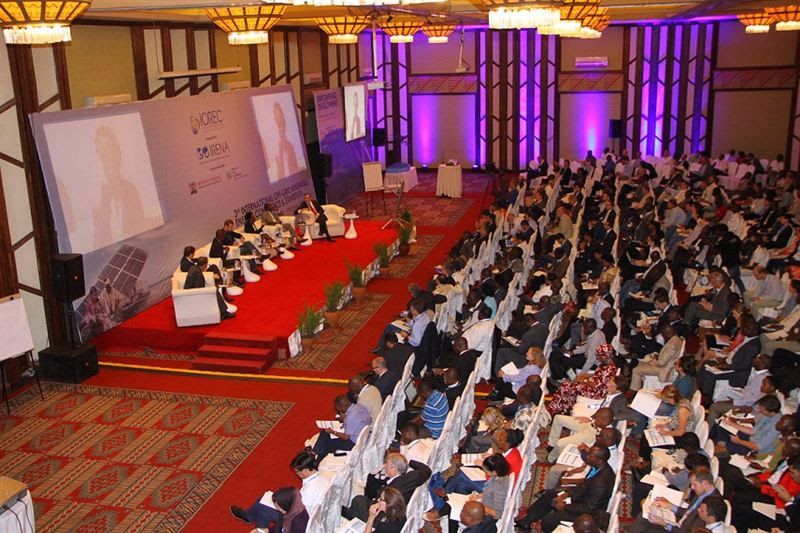3rd International Off-Grid Renewable Energy Conference in Nairobi to drive off-grid deployment worldwide

More than 500 participants gathered in Nairobi September 30 for the opening of the third International Off-Grid Renewable Energy Conference (IOREC). Organised by the International Renewable Energy Agency (IRENA), the conference aimed to boost electricity access through the development of off-grid renewables. Today, roughly 15% of the world’s population lives without electricity, but off-grid solutions can provide an estimated 60%t of the additional generation needed to achieve universal access.
“Access to electricity is a central building block for socio-economic development. It empowers communities to increase income and productivity, gain access to healthcare and education, enhance water and food security, and improve general well-being,” said IRENA Director-General Adnan Z. Amin. “Thankfully, a confluence of factors including cost declines and technology innovations, are making it more possible than ever to achieve universal electricity access through off-grid renewables.”
Speaking at the opening session, Cabinet Secretary Mr. Charles Keter of the Kenya Ministry of Energy and Petroleum detailed the many examples of standalone and mini-grid renewable energy systems in place and under development throughout the country.
“Kenya is committed to ensuring universal access to energy by 2020. This will be achieved through exploitation of the locally available energy sources including off-grid solutions,” said Cabinet Secretary Mr. Charles Keter, adding that his country welcomes private sector players both locally and internationally to invest in the country’s energy sector.
To further support the proliferation of off-grid renewables, three new reports were released during the event:
Policies and Regulations for Private Sector Renewable Energy Mini-grid
Governments must play a key role in creating policy environments where off-grid renewables can thrive. This report provides policymakers with the information they need to design and implement tailored policies and regulations to support off-grid development. Using recent case studies as reference points, the report analyses general and technology-specific policy and regulatory measures, and addresses licensing, tariff regulation, main-grid arrival risk and access to finance for mini-grids. Download the report.
IRENA Innovation Outlook: Renewable Mini-grids
This report, which features contributions by HOMER Energy staff, provides a detailed overview of the latest in mini-grid technology and the ongoing innovations transforming the sector. Ground-breaking improvements are underway for renewable mini-grids, not only in components but in system integration, controllability, and flexibility. Technology innovation, accompanied by innovation in business models and finance, will result in a 60% decrease in the cost of producing electricity from renewable mini-grids in the next 20 years. Download the report
Renewable Energy Benefits: Decentralized Solutions in the Agri-food Chain
This report, IRENA’s first interactive digital publication, analyses the socio-economic impacts of deploying off-grid solutions in the agriculture sector. It finds that renewable energy can generate considerable time and economic savings as well as significantly improve output in activities including production, agro-processing and cooking. Off-grid renewable energy solutions are well-positioned to deliver energy in an affordable, secure and environmentally-sustainable way along all steps of the agri-food chain. Download the report
IOREC 2016 focused on four overarching themes: stand-alone systems for rapid expansion of electricity access; technology innovation to unlock new opportunities; mini-grid development to meet growing demand; and socio-economic benefits of off-grid renewable energy system deployment. Participants will share experiences and best practices on the design and implementation of enabling policies, tailored financing schemes, innovative business models, and technology applications to boost off-grid development.
“Off-grid renewable energy technologies represent an opportunity for transformative change in the way we approach electrification,” said Mr. Amin. “IOREC offers a platform to share the work being conducted in this space, and define future work on the topic that will be vital to achieving global sustainable development goals.”
IOREC is conducted in partnership with the Kenyan Ministry of Energy and Petroleum and the Alliance for Rural Electrification (ARE). Parallel to the conference, ARE held an exhibition for the private sector to showcase renewable energy projects and products.
Follow the discussion online at #IOREC
IOREC 2016 information: www.iorec.org
